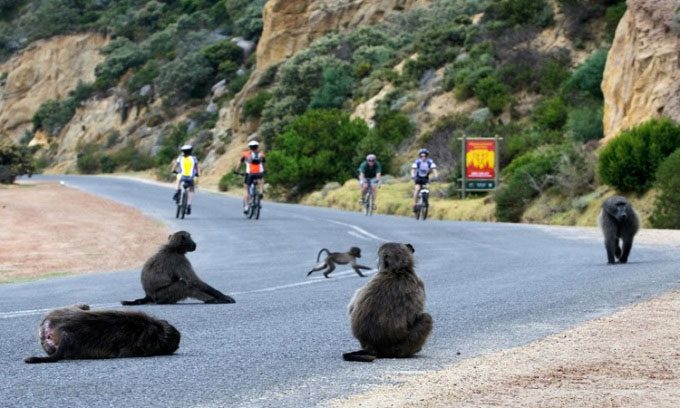The chacma baboon is attracted to easily accessible food sources in the trash bins and gardens of residents in Cape Town.
In the suburbs of Cape Town, an unusual scavenger is rummaging through trash bins and yards. The chacma baboon, a native species to southern Africa, has become quite accustomed to urban environments. Most chacma baboons spend a significant amount of time on the hills and slopes on the outskirts of Cape Town. However, their traditional foraging grounds are in flatter lowlands, right next to the expanding suburbs over the last few decades. This has created a conflict of interest, as many residents are uncomfortable with the presence of the baboon troop, according to CNN.

Chacma baboons spilling onto the streets in Cape Town, South Africa. (Photo: Brett Cole).
Baboon researcher Esme Beamish from the African Community and Wildlife Institute at the University of Cape Town explains that the baboons foraging in the city makes sense. “Our environment attracts chacma baboons not only because of excess food, lush gardens, and trash bins, but also because there is plenty of space for them to play“, Beamish said.
The easy access to food from trash bins in Cape Town means that chacma baboons spend less time and energy foraging, allowing them to focus more on interacting with potential mates and other members of their troop. However, there are significant consequences for both humans and chacma baboons. Some baboons have clashes with residents and pets. In their search for food, they can destroy crops of local farmers and winemakers.
Beamish expresses concern for the welfare of the baboon troop. “Chacma baboons are exposed to domestic dogs, vehicles, and power lines. These are some of the main causes of death and injury for them. Currently, the baboon population is not very healthy. They suffer from skin diseases due to spending too much time near trash bins and have poor dental health,” Beamish stated.
Previously, local councils and residents attempted to mitigate the issue by limiting leftover food and using trash bins designed to keep chacma baboons out, as well as erecting fences in 2013. In some cases, residents shot at the baboons with pellet guns and euthanized particularly aggressive or troublesome individuals. The presence of baboons on the streets has decreased, but some people are concerned that they may disappear from the surrounding natural areas if pushed too far away. In September, the city of Cape Town announced plans to build more fences to keep chacma baboons out of rural areas.
The initial plan is to erect fences at several locations along the Cape Peninsula, the natural habitat of the species, followed by fences along the edges of the western suburbs of Cape Town. By reducing access to densely populated areas, authorities hope that the chacma baboons will retreat back to the hills. Jenni Trethowan, founder of the conservation organization Baboon Matters, also believes that keeping chacma baboons away from humans is the best solution for both parties.


















































